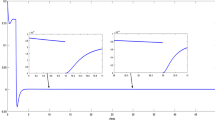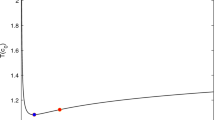Abstract
In this paper, we investigate input-to-state stability (ISS) problem for a general model of hybrid stochastic systems with unbounded delays and impulsive effects, in which stochastic disturbances involve white noise and Markov chain. Firstly, we establish a novel differential inequality with unbounded delays and variable inputs, which extends and improves some existing results. Then, by using the obtained inequality, the sufficient conditions are derived to determine ISS properties on impulsive robustness and impulsive stabilization for the impulsive stochastic systems with unbounded delays. The results not only show that the ISS properties still remain under certain impulsive perturbations for some continuous stable systems, but also indicate that an unstable system can be successfully stabilized to be input-to-state stable by impulses even if the corresponding continuous system is unstable. The obtained criteria are applied to study the ISS problems for impulsive stochastic neural networks and the systems of energy-storing electrical circuit. Finally, two numerical examples and their simulations are given to illustrate the validity of theoretical results.











Similar content being viewed by others
References
Sontag, E.D.: Smooth stabilization implies coprime factorization. IEEE Trans. Autom. Control 34, 435–443 (1989)
Sontag, E.D., Wang, Y.: On characterizations of the input-to-state stability property. Syst. Control Lett. 24, 351–360 (1995)
Jiang, Z.P., Wang, Y.: Input-to-state stability for discrete-time nonlinear systems. Automatica 37, 857–869 (2001)
Sontag, E.D.: Further facts about input to state stabilization. IEEE Trans. Autom. Control 35, 473–476 (1990)
Liu, B., Hill, D.: Input-to-state stability for discrete time-delay systems via the Razumikhin technique. Syst. Control Lett. 58, 567–575 (2009)
Haykin, S.: Neural networks. Prentice-Hall, NJ (1994)
Mao, X.R.: Stability of stochastic differential equations with Markovian switching. Stoch. Processes Appl. 79, 45–67 (1999)
Tsinias, J.: Stochastic input-to-state stability and applications to global feedback stabilization. Int. J. Control 71, 907–930 (1998)
Huang, L., Mao, X.: On input-to-state stability of stochastic retarded systems with markovian switching. IEEE Trans. Autom. Control 54, 1898–1902 (2009)
Li, M., Liu, L., Deng, F.: Input-to-state stability of switched stochastic delayed systems with lévy noise. J. Franklin Inst. 355, 314–331 (2018)
Zhang, M., Zhu, Q.: New criteria of input-to-state stability for nonlinear switched stochastic delayed systems with asynchronous switching. Syst. Control Lett. 129, 43–50 (2019)
Yeganefar, N., Pepe, P., Dambrine, M.: Input-to-state stability of time-delay systems: a link with exponential stability. IEEE Trans. Autom. Control 53, 1526–1531 (2008)
Wang, Y.E., Sun, X.M., Shi, P., Zhao, J.: Input-to-state stability of switched nonlinear systems with time delays under asynchronous switching. IEEE Trans. Cybern. 43, 2261–2265 (2013)
Pepe, P., Karafyllis, I., Jiang, Z.P.: Lyapunov–Krasovskii characterization of the input-to-state stability for neutral systems in Hale’s form. Syst. Control Lett. 102, 48–56 (2017)
Mironchenko, A., Wirth, F.: Characterizations of input-to-state stability for infinite-dimensional systems. IEEE Trans. Autom. Control 63, 1692–1707 (2017)
Lakshmikantham, V., Simeonov, P.S.: Theory of Impulsive Differential Equations, vol. 6. World Scientific, Singapore (1989)
Liu, B., Marquez, H.J.: Quasi-exponential input-to-state stability for discrete-time impulsive hybrid systems. Int. J. Control 80, 540–554 (2007)
Yang, Z., Hong, Y., Jiang, Z.P.: Input-to-state stability of hybrid switched systems with impulsive effects. In: 2008 7th World Congress on Intelligent Control and Automation, pp. 7172–7176 (2008)
Hespanha, J.P., Liberzon, D., Teel, A.R.: Lyapunov conditions for input-to-state stability of impulsive systems. Automatica 44, 2735–2744 (2008)
Dashkovskiy, S., Mironchenko, A.: Input-to-state stability of nonlinear impulsive systems. SIAM J. Control Optim. 51, 1962–1987 (2013)
Chen, W.H., Zheng, W.X.: Input-to-state stability and integral input-to-state stability of nonlinear impulsive systems with delays. Automatica 45, 1481–1488 (2009)
Liu, J., Liu, X., Xie, W.C.: Input-to-state stability of impulsive and switching hybrid systems with time-delay. Automatica 47, 899–908 (2011)
Li, X., Zhang, X., Song, S.: Effect of delayed impulses on input-to-state stability of nonlinear systems. Automatica 76, 378–382 (2017)
Peng, S., Deng, F.: New criteria on \(p\) th moment input-to-state stability of impulsive stochastic delayed differential systems. IEEE Trans. Autom. Control 62, 3573–3579 (2017)
Ren, W., Xiong, J.: Vector Lyapunov function based input-to-state stability of stochastic impulsive switched time-delay systems. IEEE Trans. Autom. Control 64, 654–669 (2018)
Sanchez, E.N., Perez, J.P.: Input-to-state stability (ISS) analysis for dynamic neural networks. IEEE Trans. Circ. Syst. I: Fundam. Theory Appli. 46, 1395–1398 (1999)
Ahn, C.K.: Passive learning and input-to-state stability of switched hopfield neural networks with time-delay. Inf. Sci. 180, 4582–4594 (2010)
Ahn, C.K.: Some new results on stability of Takagi–Sugeno fuzzy hopfield neural networks. Fuzzy Set Syst. 179, 100–111 (2011)
Zhu, S., Shen, Y.: Two algebraic criteria for input-to-state stability of recurrent neural networks with time-varying delays. Neural Comput. Appl. 22, 1163–1169 (2013)
Zhu, Q., Cao, J., Rakkiyappan, R.: Exponential input-to-state stability of stochastic Cohen–Grossberg neural networks with mixed delays. Nonlinear Dyn. 79, 1085–1098 (2015)
Zhou, W., Teng, L., Xu, D.: Mean-square exponentially input-to-state stability of stochastic Cohen–Grossberg neural networks with time-varying delays. Neurocomputing 153, 54–61 (2015)
Li, Z., Lei, L., Zhu, Q.: Mean-square exponential input-to-state stability of delayed Cohen–Grossberg neural networks with Markovian switching based on vector Lyapunov functions. Neural Netw. 84, 39–46 (2016)
Liu, L., Cao, J., Qian, C.: \(P\)th moment exponential input-to-state stability of delayed recurrent neural networks with Markovian switching via vector Lyapunov function. IEEE Trans. Neural Netw. Learn. Syst. 29, 3152–3163 (2017)
Liu, L., He, X., Wu, A.: \(P\)th moment exponential input-to-state stability of non-autonomous delayed Cohen–Grossberg neural networks with Markovian switching. Neurocomputing 349, 44–51 (2019)
Xu, G., Bao, H.: Further results on mean-square exponential input-to-state stability of time-varying delayed BAM neural networks with Markovian switching. Neurocomputing 376, 191–201 (2020)
Yang, Z., Zhou, W., Huang, T.: Exponential input-to-state stability of recurrent neural networks with multiple time-varying delays. Cogn. Neurodyn. 8, 47–54 (2014)
Li, J., Zhou, W., Yang, Z.: State estimation and input-to-state stability of impulsive stochastic BAM neural networks with mixed delays. Neurocomputing 227, 37–45 (2017)
Yang, Z., Zhou, W., Huang, T.: Input-to-state stability of delayed reaction-diffusion neural networks with impulsive effects. Neurocomputing 333, 261–272 (2019)
Berman, A., Plemmons, R.J.: Nonnegative Matrices in the Mathematical Sciences. SIAM, Philadelphia (1994)
Yang, Z., Xu, D., Xiang, L.: Exponential \(p\)-stability of impulsive stochastic differential equations with delays. Phys. Lett. A 359, 129–137 (2006)
Xu, L., Dai, Z., Hu, H.: Almost sure and moment asymptotic boundedness of stochastic delay differential systems. Appl. Math. Comput. 361, 157–168 (2019)
Li, H., Li, C., Wei, Z., Jing, X.: Global dissipativity of inertial neural networks with proportional delay via new generalized Halanay inequalities. Neural Process. Lett. 6, 1–19 (2018)
Liu, L.: New criteria on exponential stability for stochastic delay differential systems based on vector Lyapunov function. IEEE Trans. Syst. Man Cybern. Syst. 47, 2985–2993 (2016)
Chen, T., Wang, L.: Global \(\mu \)-stability of delayed neural networks with unbounded time-varying delays. IEEE Trans. Neural Netw. 18, 1836–1840 (2007)
Mao, X., Matasov, A., Piunovskiy, A.B.: Stochastic differential delay equations with Markovian switching. Bernoulli 6, 73–90 (2000)
Chen, G., Wei, F., Wang, W.: Finite-time stabilization for stochastic interval systems with time delay and application to energy-storing electrical circuits. Electronics 8(2), 175 (2019)
Zhu, S., Chen, G., Yang Y.: Finite-time passive control for interval energy-storing electrical circuit model with time-delay and Markov switching. In: 2018 Chinese Control And Decision Conference (CCDC) (2018)
Liu, B., Dou, C., Hill, D.: Robust exponential input-to-state stability of impulsive systems with an application in micro-grids. Syst. Control Lett. 65(1), 64–73 (2014)
Acknowledgements
This work is partially supported by the National Natural Science Foundation of China (NSFC) under Grant Nos. 11971081, 11971076, the Science and Technology Research Program of Chongqing Municipal Education Commission under Grant No. KJZD-M202000502, the Program of Chongqing Graduate Research and Innovation Project under Grant Nos. CYS19290, CYS20242. The authors are also very thankful to anonymous reviewers for their positive advice and helpful suggestion.
Author information
Authors and Affiliations
Corresponding author
Ethics declarations
Conflict of interest
The authors declare that they have no conflict of interest.
Additional information
Publisher's Note
Springer Nature remains neutral with regard to jurisdictional claims in published maps and institutional affiliations.
Appendices
Appendix A: Proof of Theorem 4.1
Proof
Let \(V_i(x(t),r)=\zeta ^p_i(r)|x_i(t)|^p\), \(V(x(t),r)=(V_1(x(t),r)\), \(V_2(x(t),r),\cdots ,V_n(x(t),r))^T\), where \(x(t)=(x_1(t),x_2(t),\cdots ,x_n(t))^T\) is the solution of system (1) with the initial condition (2). We have
where \(sgn(\cdot )\) is the sign function. Then, by generalized \(It{\hat{o}}\) formula, we have
On the other hand, when \(t=t_k,\) from (\(A_3\)) and (\(A_5\)) , we get
It follows from Theorem 3.1 that
where \({\underline{\eta }}=\min \limits _{r\in {\mathbb {M}},1\le i\le n} \zeta ^p_i(r), \overline{\eta }=\max \limits _{r\in {\mathbb {M}},1\le i\le n} \zeta ^p_i(r)\). We get
This finishes the proof of Theorem 4.1. \(\square \)
Appendix B: Proof of Theorem 4.2
Proof
Let \(W_i(x(t),r)=\zeta ^p_i(r)|x_i(t)|^p\). According to Theorem 4.1, we have
where \({\tilde{P}}_{ij}(t), {\tilde{Q}}_{ij}(t)\) are defined by (20) and \(U_i(t)=\max \limits _{r\in {\mathbb {M}}}\{\zeta ^p_i(r)|u_i(t)|^p\}\). On the other hand, when \(t=t_k\), we get
It follows from Theorem 3.2 that
where \( t\ge 0, K=\frac{z_i\max \limits _{r\in {\mathbb {M}},1\le i\le n} \zeta ^p_i(r)}{\min \limits _{r\in {\mathbb {M}},1\le i\le n} \zeta ^p_i(r)}\). Therefore, we have
where \(t\ge 0\). The proof is completed. \(\square \)
Rights and permissions
About this article
Cite this article
Zhang, Y., Yang, Z., Huang, C. et al. Input-to-state stability of hybrid stochastic systems with unbounded delays and impulsive effects. Nonlinear Dyn 104, 3753–3770 (2021). https://doi.org/10.1007/s11071-021-06480-6
Received:
Accepted:
Published:
Issue Date:
DOI: https://doi.org/10.1007/s11071-021-06480-6




